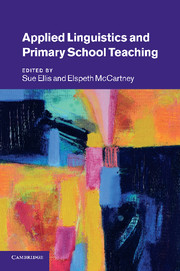Book contents
- Frontmatter
- Contents
- List of figures
- List of tables
- Notes on contributors
- Preface
- Editors' notes and conventions
- Introduction
- Part I Policy and diversity in the twenty-first-century primary school
- Introduction to Part I
- 1 The control of language or the language of control? Primary teachers' knowledge in the context of policy
- 2 Working with children who speak English as an additional language: an Australian perspective on what primary teachers need to know
- 3 Preparing for diversity: the alternatives to ‘linguistic coursework’ for student teachers in the USA
- 4 Supporting children with speech, language and communication needs
- 5 Foreign language teaching in the primary school: meeting the demands
- Part II The range and focus of applied linguistics research
- Part III Empowering teachers and teachers' use of knowledge
- References
- Index
1 - The control of language or the language of control? Primary teachers' knowledge in the context of policy
Published online by Cambridge University Press: 26 April 2011
- Frontmatter
- Contents
- List of figures
- List of tables
- Notes on contributors
- Preface
- Editors' notes and conventions
- Introduction
- Part I Policy and diversity in the twenty-first-century primary school
- Introduction to Part I
- 1 The control of language or the language of control? Primary teachers' knowledge in the context of policy
- 2 Working with children who speak English as an additional language: an Australian perspective on what primary teachers need to know
- 3 Preparing for diversity: the alternatives to ‘linguistic coursework’ for student teachers in the USA
- 4 Supporting children with speech, language and communication needs
- 5 Foreign language teaching in the primary school: meeting the demands
- Part II The range and focus of applied linguistics research
- Part III Empowering teachers and teachers' use of knowledge
- References
- Index
Summary
Introduction
In this chapter it is argued that decisions about teacher knowledge are inextricably linked with decisions about national curriculum policies and that these increasingly have been affected by political control. The chapter concentrates on the example of England, showing how national curriculum reform, in most phases of the education system, has had an impact on requirements for teachers' knowledge. As a consequence of the wide range of potential linguistic topics that could inform teaching, it is recommended that the selection of appropriate topics should be informed by principles that limit and focus the range of knowledge. Successful implementation of such principles needs to take account of the tension between political control and evidence-informed practice if new knowledge is to inform teaching and learning.
The concern of this book, namely the linguistic knowledge that it is important for primary teachers to understand, is affected by a wider concern: who decides what primary teachers need to understand? The question is important because even the most logical and persuasive case for a particular kind of linguistic knowledge is unlikely to achieve the impact and influence it deserves if some of the answers to this question are not considered. In this chapter I explore the influence that political processes have had on decisions about subject knowledge, which, I reveal, are inextricably linked with curriculum and pedagogical reform.
- Type
- Chapter
- Information
- Applied Linguistics and Primary School Teaching , pp. 21 - 31Publisher: Cambridge University PressPrint publication year: 2011
- 1
- Cited by

